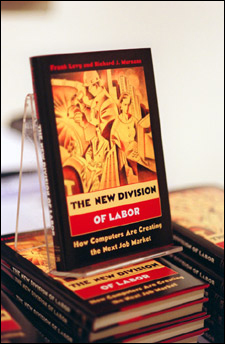The computer ate my job
Economists educate the future work force at GSE lecture

As the nation limps toward economic recovery, uneasy Americans – jobless or not – harbor understandable anxiety. Could my job be done by a computer? Will it go overseas to be done far more cheaply? Will there be enough jobs to go around?
Yes, the future holds enough jobs for us all, was the tentative answer provided by a pair of economists at an Askwith Education Forum Monday night (May 3). But they may not be the same jobs we’ve been doing, or they may be different from the jobs we’ve educated our work force to do, said Richard Murnane, the Graduate School of Education’s (GSE) Thompson Professor, and M.I.T. economist Frank Levy.
In a lecture provocatively titled “Computers, Off-Shoring, and the Future of American Work,” the duo discussed their forthcoming book, “The New Division of Labor: How Computers are Creating the New Job Market” (Princeton University Press, 2004). With moderator Richard Lester, professor of nuclear engineering at M.I.T., and Boston Globe “Economic Life” columnist Charles Stein, they analyzed labor data and made cautious predictions and prescriptions for a productive future.
“Even as the number of jobs increases, the manufacturing jobs that went over to China won’t be coming back, the call center jobs that have been lost won’t be coming back, and the jobs that have been lost to automation and technology won’t be coming back,” said Levy, who is the Rose Professor of Urban Economics and co-author of an earlier book with Murnane called “Teaching the New Basic Skills: Principles for Educating Children to Thrive in a Changing Economy” (Free Press, 1996).
Showing patterns of increasing or declining jobs in a variety of sectors over the past 30 years, the authors found what might be expected: that blue collar

jobs declined precipitously, clerical and administrative jobs dropped, and occupations requiring higher levels of education – sales, technical, professional, and managerial – rose. Yet service jobs, the face-to-face physical work of security guards, store clerks, and the like, also increased, bucking the trend toward higher education.
“Computerized work has an awful lot to do with this,” Levy said. Jobs that process information with yes or no questions have been most vulnerable to being lost to computerization, he said, citing computerized airline boarding pass kiosks as an example. Does the passenger’s inserted credit card match the information held by the computer? Does the passenger have a seat assignment? Does he want to sit on the aisle? By the window? The computer processes these questions as well as yesterday’s ticket counter representative did. But no computer can tell you whether the size-eight dress you’re ordering from Land’s End will make you look fat, he said; that’s a secure service job.
Offshoring has a similar impact on job loss. “The more precisely you can write down a job in rules, the easier it is to program,” said Levy. “But if you can more or less write down a job in rules, it’s easy to send it off to somebody else in a different country without enormous misunderstanding.”
Education’s role
Tag-teaming with Levy to present the primary points of the book, Murnane explored the human skills that can survive computerization and offshoring, and how we’re preparing workers to acquire those skills.
While computers may excel at processing yes or no questions, they fail at pattern recognition, identifying and solving problems, expert thinking, and complex communication, Murnane said. Computer diagnostics might tell an auto mechanic that an ailing car’s systems are running perfectly, yet the mechanic can’t start the car. It’s his problem-solving skills that will trump the digital technology to put the car back on the road.

Murnane, most of whose research has focused on the relationship between education and the economy, discussed the role of education in preparing secure workers. “You need a lot of knowledge about the domain in which the problem is occurring, but they can’t be memorized facts,” he said.
As an example, he showed two potential answers to the social studies test question “What is the date of the battle of the Spanish Armada?” The first provided the date – 1588 – but was unable to provide any contextual knowledge about why that date was important. A second student answered “around 1590,” telling the teacher he drew this conclusion based on knowledge of the historical context of Spain, England, and exploration.
“In a world that has Google on every computer, just getting the date doesn’t take very long at all,” Murnane said. The second answer, of course, is the more useful response for the prepared workforce of the future.
Incentives such as standards-based reform are important in moving education toward this sort of training, Murnane said, but “incentives alone work only when the people whose behavior you want to change know how to do what you want them to do.” Training all students to engage in complex communication and expert thinking, he said, is a challenge American schools have never met. “There’s an enormous capacity-building challenge,” he said.
Further, said Murnane, education shoulders a significant part of the burden of improving the supply of workers, but it’s not all that matters, contrary to what some policy-makers think. “The challenge for public policy is to reduce the pain for the people who experience the job loss, and to do so in a manner without diminishing incentives,” he said, voicing loud support for universal health care.
Murnane concluded that computers’ impact on America’s work force is widespread but that, despite recent alarms from the high-tech industry, the effect of offshoring is modest. There will, he said, be enough jobs in our future. “But the jobs are going to be very different than the jobs in the past.”




